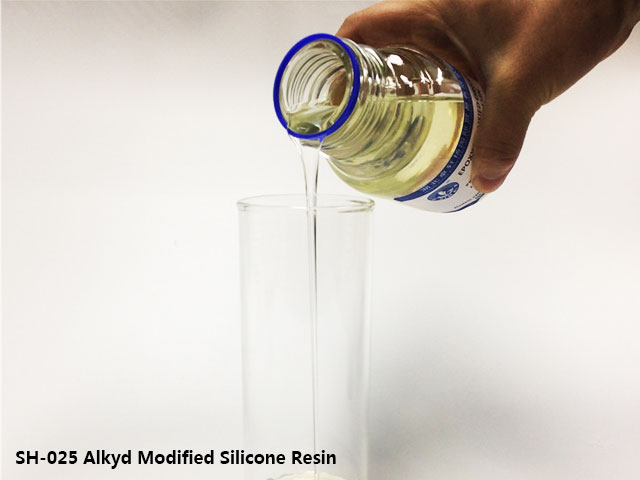Modified Silicone Polyester Resin with Different PolyolsIn this study, we aimed to synthesize polyester modified silicone resin using different polyols. The procedure involved modifying organic silicone resin with polyester obtained from various polyols. The synthesis method differed depending on the polyol used.
For the synthesis of polyester resin from trimethylpropanone, the following components were added to a 50ml four-necked flask: 14.7g of trimethylpropanone, 9.02g of isophthalic acid, and 3.97g of adipic acid. The mixture was stirred and heated gradually at a rate of 60 °C/h under nitrogen protection. Dehydration commenced at approximately 180 °C, and the heating rate was reduced to 15 °C/h. The temperature was then raised to 200-210 °C, and the vacuum dehydration condensation reaction took place. Xylene could also be added to aid dehydration until the acid value dropped to 10-13mgKOH/g. The mixture was cooled to 150 °C, and acetyl propylene glycol methyl alcohol was added to adjust the solid content of the polyester resin to 75%.

To synthesize modified silicone resin from trimethyl propionate as the raw material, the same method as described above was followed, but the polyol used was changed. Instead of trimethylpropanone, 14.9g of pentaerythritol or 10.9g of ethylene glycol was used, depending on the experiment.
In the synthesis of modified silicone resin, a 100ml four-necked flask was used. 27.92g of Olg, Z-6018 organosilicon intermediate and 18.3g of acetyl propylene glycol methyl ester (AcOCH(CH3)C(O)OMe) were added. Additionally, 0.05 parts of cyanate coupling agent were included. The mixture was stirred, and the temperature was raised at a rate of 30 °C/h under nitrogen gas protection. Dehydration commenced at around 116 °C, and the temperature was maintained at 122-126 °C for 5 hours. After cooling to 100 °C, acetyl propylene glycol formal (16.76g) and n-butanol (0.98g) were added, and the mixture was thoroughly stirred to obtain a polyester modified silicone resin with a solid content of 50%.
The obtained modified resins with different silicon intermediate contents were then sprayed onto tinplate substrates. The dry films were formed by subjecting the coated substrates to 280 °C for 10 minutes. The film thickness was measured using a metal film thickness gauge, and a film thickness of 17-19 µm was selected as the standard detection plate.
The research results indicated that the performance of the modified resin varied depending on the polyol used. When the silicon content was the same, the modified resin derived from ethylene glycol exhibited the best adhesion and flexibility, although its heat resistance was the poorest. On the other hand, the modified resin obtained from trimethylpropionol showed the best heat resistance. Considering overall performance, the modified resin synthesized from trimethylpropionol was determined to be the most favorable choice.
TopWin is one of the leading & professional manufacturers with more than 20 years of experience and has domestic top-level engineers in the silicone surfactant industry. We specialized in producing all kinds of SILICONE BASED new materials and specialized in research, production, sales, and marketing of silicone-based performance materials. Provide good OEM&ODM service. Our products are mainly used in polyurethane foam, Agriculture, Coatings and Inks, Leather & Textiles, Pulp and Paper, Cosmetic industry, etc.